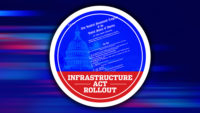Seeking advances in applying new transportation technologies, the U.S. Dept. of Transportation has opened competition for two technology-related grant programs totaling $800 million over five years. The agency announced on Sept. 19 that it is now accepting applications for grants funded by the two programs' combined first-year allocation of $160 million.
The larger of the two was created in the Infrastructure Investment and Jobs Act and is called Strengthening Mobility and Revolutionizing Transportation, or SMART. The law provides $500 million over five years for SMART, and DOT is seeking applications for the first year's allocation of $100 million.
According to the DOT funding-availability notice, the program funds projects "that are focused on using technology interventions to solve real-world challenges and build data and technology capacity and expertise in the public sector.”
'SMART' Will Start Small
Of SMART's two stages, the first is for “planning and prototyping" grants of up to $2 million per project, says DOT. Stage-one projects do not require a nonfederal matching contribution. The initial request for applications will only be for stage-one grants.
Stage two is for implementation grants of up to $15 million per project. DOT says it anticipates opening the process to both stage-one and -two grants in fiscal 2023.
DOT says projects could deal with such topics as vehicle technology—including autonomous and connected vehicles—logistics, signals and Smart Grid and data integration. Evaluation factors include safety and reliability, resilience, equity and access, addressing climate change and integrating transportation systems and connectivity, according to the DOT notice.
Applicants can include states, localities, tribes, transit agencies, toll authorities and metropolitan planning organizations. Groups of two or more of those entities can file a group application.
'ATTAIN' Revamps Older Program
The second program is a revised version of a seven-year-old one that DOT's Federal Highway Administration has renamed Advanced Transportation Technology and Innovation, or ATTAIN. It had been called the Advanced Transportation and Construction Management Technologies program and was established under the 2015 Fixing America’s Surface Transportation (FAST) Act.
The new infrastructure law holds ATTAIN funding at its predecessor’s level of $60 million a year for five years. But the law adds some new purposes for ATTAIN, to include promoting transportation equity and addressing the impacts of climate change. [View ATTAIN FAQ's here.]
“The Biden-Harris administration has taken a program with a track record of delivering innovation through the use of advanced technologies and made it truly forward-looking by refocusing its goals to include promoting equity and tackling climate change, in addition to creating jobs and delivering positive economic impact,” acting Federal Highway Administrator Stephanie Pollack said in a statement,
In its funding-availability notice, FHWA said ATTAIN's purposes are "to deploy, install and operate advanced transportation technologies to improve safety, mobility, efficiency, system performance, intermodal connectivity and infrastructure return on investment."
The agency also said it anticipates awarding no fewer than five and no more than 10 ATTAIN grants of up to $12 million each.
States, localities, tribes, transportation authorities are eligible to apply for ATTAIN. The program's funding is limited to no more than 80% of a project’s cost; the other 20% must come from nonfederal funds.
FHWA says the types of projects could include advanced traveler information systems, safety systems, data collection and analysis, transportation management technologies and technologies to improve emergency evacuation and response.
Other possibilities include technology for advanced public transportation systems, enhanced high-occupancy toll lanes, and intelligent transportation systems that are integrated with the Smart Grid.
Applications for SMART and ATTAIN are due by Nov. 18.
Laura Chace, ITS America president and CEO, said in comments emailed to ENR that the funding for SMART and ATTAIN "represents vital improvements in infrastructure as well as connected and automated vehicle technologies."
She said, "This will lead to improved mobility in communities across the country and allow us to learn more about how Americans travel, and in turn, make that travel safer, greener and smarter."





Post a comment to this article
Report Abusive Comment